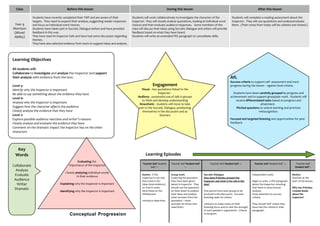
Year 9 lesson 25th june
- 1. Class Before this lesson During this lesson After this lesson Year 9 Morrison (Mixed Ability) Students have recently completed their TMP and are aware of their targets. They need to expand their analysis, suggesting reader responses and focus on individual word choices. Students have taken part in Socratic Dialogue before and have provided feedback in this way. They have read An Inspector Calls and have had some discussion regarding themes. They have also selected evidence from texts to support ideas and analysis. Students will work collaboratively to investigate the character of the Inspector. They will closely analyse quotations, looking at individual word choices and then evaluate audience responses. Some members of the class will discuss their ideas using Socratic dialogue and others will provide feedback based on what they have heard. Students will write an extended PEE paragraph to consolidate skills. Students will complete a reading assessment about the Inspector. They will use quotations and analyse/evaluate them. (Their notes from today will be collated and shared.) Learning Objectives All students will: Collaborate to investigate and analyse the Inspector and support their analysis with evidence from the text. Level 5: Identify why the Inspector is important Be able to say something about the evidence they have Level 6: Analyse why the Inspector is important Suggest how the character affects the audience Closely analyse the evidence that they have Level 7: Explore possible audience reactions and writer’s reasons Closely analyse and evaluate the evidence they have Comment on the dramatic impact the Inspector has on the other characters Key Words Collaborate Analyse Evaluate Audience Writer Dramatic AfL Engagement Visual – key quotations linked to the Inspector Auditory - purposeful use of talk in groups to think and develop understanding Kinesthetic - students will move to take part in the Socratic Dialogue, positioning themselves in the discussion and as listeners Success criteria to support self -assessment and track progress during the lesson – against level criteria. Students have been carefully grouped by progress and achievement and to support group/pair work. Students will receive differentiated tasks based on progress and attainment. Pitched questions to unlock learning and promote metacognition. Focused and targeted listening and opportunities for peer feedback. Learning Episodes Evaluating the Importance of the Inspector Closely analysing individual words In their evidence Explaining why the Inspector is important Identifying why the Inspector is important Teacher led? Student led? 10 Teacher led? Student led? 15 Starter: If the Inspector is not real, then what is he? Ideas (and evidence) on Post-it notes. Stick these on the Whiteboard. Group work Exploring the quotation they have been given about in Inspector. They should use the questions on their sheet to explore their ideas and analyse what we learn from the quotation – more prompts for those who need them. Introduce objectives. Conceptual Progression Teacher led? Student led? 10 Socratic Dialogue How does Priestley present the Inspector and what is his role in the play? One person from each group to be involved in the discussion. Focused listening tasks for others. Listeners to make notes on their listening focus and to rank the strength of each speaker’s argument/s. Criteria to be given. Teacher led? Student led? 15 Independent work: Begin to write a PEE paragraph about the Inspector, ensuring that there is close textual analysis. Draw attention to success criteria. They should ‘tick’ where they have met the criteria in their paragraph. Teacher led? Student led? 5 Review Decision at the start of the lesson. Why has Priestley created doubt about the Inspector?